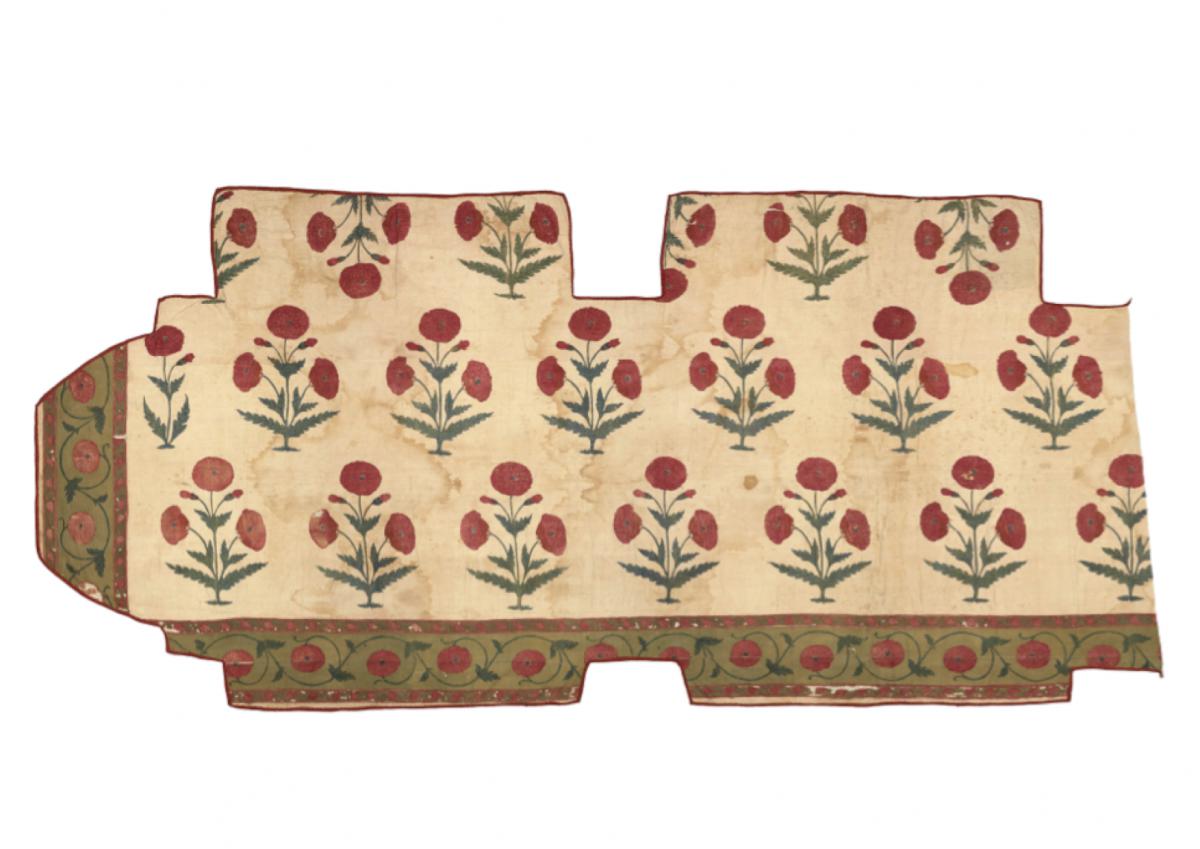Silvia Maglioni & Graeme Thomson - common infra/ctions
Centre for Language Unlearning
Unlearning #2 :
Unlearning privilege - talking with the disappeared
screening, reading, cooking and conversations
Workshop with Jesal Kapadia

Fugitive green: fragment of a floorspread, 2016
Rows of red poppies line the center of this magnificent floor spread, which was later cut and hemmed to be repurposed. As in several instances, the main motif changes direction in certain areas; here, alternate poppy plants appear upside down in the top row. The spread was made through the laborious process known as kalamkari, in which green is achieved by painting a yellow dye over areas tinted with indigo, but the yellow often faded, leaving only the undercoat of blue. Remarkably, the usually fugitive green is well preserved in this work.
She said: Sometimes the line between the system and a revolution is just a river. After all, isn’t the fight between the forces of resistance and the system of domination almost just as old as the Euphrates and the Ganges?
So we will spend a whole evening on reversing the flows, unlearning our ways of seeing and doing, being together, holding a continuous non-stop relay reading of keywords that arrive from the feminine consciousness.
She said: Mutiny can be as much internally directed as against objectionable external command, involving the tougher task of first exiting his or her self-fashioning as a voluntary sentinel of an unjust status quo, or rather involving those practices of auto-disassembly so eloquently described as releasing oneself from oneself, or straying afield from or deserting oneself!
Approaching what is not exclusively ends-driven, giving equal merit to process and refusing to participate in any perpetuation of the status quo, and in doing so appearing ungenerative, with commitment to inconsequential or inessential things, addressing concepts that have to do with learning to learn from below, by talking with the disappeared...voices, tongues, color, forms of life and ways of being. Searching for the common cause and not the common wealth.
She said, again: Our body is actually an upside down tree.
Calling for the suspension of causative thinking and action, feeling backward, reversing the imaginary of successive time, exiting the privileges of real and symbolic/social reproduction, failing, inconsequentially, and entering non-reproductive thought.
-------------------
This workshop is open to all.
Reservation is advised
to reservation@leslaboratoires.org or 01 53 56 15 90
-------------------
Jesal Kapadia is an artist from Bombay and many different cities. Using various mediums, her work explores the potential forms of non-capitalist subjectivities. Her interests lie in an ethical praxis of being-in-common, and the cultivation of an awareness of art that is place-based, diversified, multiple, small-scale, collective and autonomous. Jesal has long been concerned with the imaginative and affective dimensions of migration that exceed purely economic analysis – how globalization and modernization feels, rather than mere statistics. Her art tends to have a connection to a prior moment of non-globalization, generating a sense of affinity for time and space that is pre-colonial, or post-capitalist, in nature. She looks for things, poems, songs, images, writings, taste, touch, dialects and voices that contain traces of an invisible order that constantly shift upon becoming visible, emphasizing a form that refuses to be captured but continues to flow into other forms, becoming pidgin.
From 2001-2014, Jesal collectively edited art for 'Rethinking Marxism' (a journal of economics, culture and society) as well as organized and participated in events with members of 16beaver group (an artist community in downtown New York that functions as an open platform for discussion, critique and collaboration). Over the last fifteen years she has taught and developed a number of courses and seminars at various schools as well as community-based or artist-organized spaces. In 2012, Jesal met with the members of Wednesday Discussion Group and the women's group WRise, both based in Cambridge MA, and has since then shared the learnings and reflections coming out of discussions with them, activating dialogues on the question of patriarchy and violence in our contemporary society.

